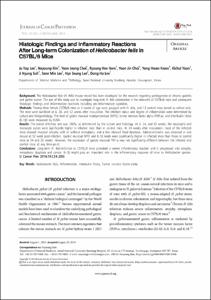KUMEL Repository
1. Journal Papers (연구논문)
1. School of Medicine (의과대학)
Dept. of Internal Medicine (내과학)
Histologic Findings and Inflammatory Reactions After Long-term Colonization of Helicobacter felis in C57BL/6 Mice
- Keimyung Author(s)
- Lee, Ju Yup
- Department
- Dept. of Internal Medicine (내과학)
- Journal Title
- Journal of Cancer Prevention
- Issued Date
- 2014
- Volume
- 19
- Issue
- 3
- Abstract
- Background: The Helicobacter felis (H. felis) mouse model has been developed for the research regarding pathogenesis of chronic gastritis and gastric cancer. The aim of this study was to investigate long-term H. felis colonization in the stomachs of C57BL/6 mice and subsequent histologic findings and inflammatory reactions including pro-inflammatory cytokines.
Methods: Twenty-three female C57BL/6 mice at 4 weeks of age were gavaged with H. felis, and 13 control mice served as vehicle only. The mice were sacrificed at 4, 24, and 52 weeks after inoculation. The infection status and degree of inflammation were determined by culture and histopathology. The level of gastric mucosal myeloperoxidase (MPO), tumor necrosis factor alpha (TNF-), and interleukin-1beta (IL-1) were measured by ELISA.
Results: The overall infection rate was 100%, as determined by the culture and histology. At 4, 24, and 52 weeks, the neutrophil and monocyte scores were significantly higher in infected mice than in control mice. At 24 weeks after inoculation, most of the infected mice showed mucosal atrophy with or without metaplasia, and a few showed focal dysplasia. Adenocarcinoma was observed in one mouse at 52 week post-infection. Gastric mucosal MPO and IL-1 levels were significantly higher in infected mice than those in control mice at 24 and 52 weeks. However, the expression of gastric mucosal TNF- was not significantly different between the infected and control mice at any time-point.
Conclusions: Long-term H. felis-infection in C57BL/6 mice provoked a severe inflammatory reaction and it progressed into atrophy, metaplasia, dysplasia and cancer. IL-1 might play an important role in the inflammatory response of mice to Helicobacter species.
- Keimyung Author(s)(Kor)
- 이주엽
- Publisher
- School of Medicine
- Citation
- Ju Yup Lee et al. (2014). Histologic Findings and Inflammatory Reactions After Long-term Colonization of Helicobacter felis in C57BL/6 Mice. Journal of Cancer Prevention, 19(3), 224–230. doi: 10.15430/JCP.2014.19.3.224
- Type
- Article
- ISSN
- 2288-3649
- Appears in Collections:
- 1. School of Medicine (의과대학) > Dept. of Internal Medicine (내과학)
- 파일 목록
-
-
Download
 oak-bbb-02716.pdf
기타 데이터 / 3.83 MB / Adobe PDF
oak-bbb-02716.pdf
기타 데이터 / 3.83 MB / Adobe PDF
-
Items in Repository are protected by copyright, with all rights reserved, unless otherwise indicated.